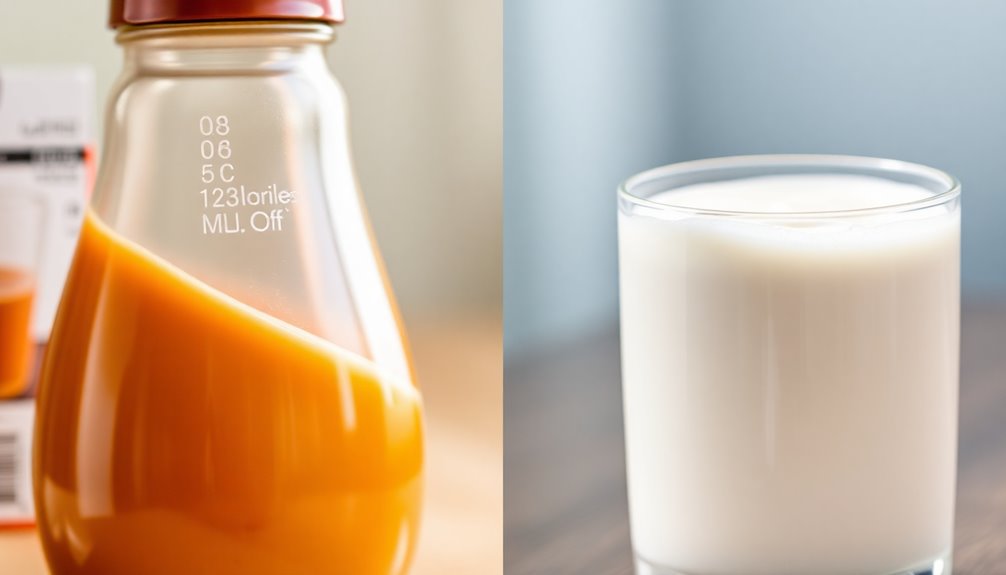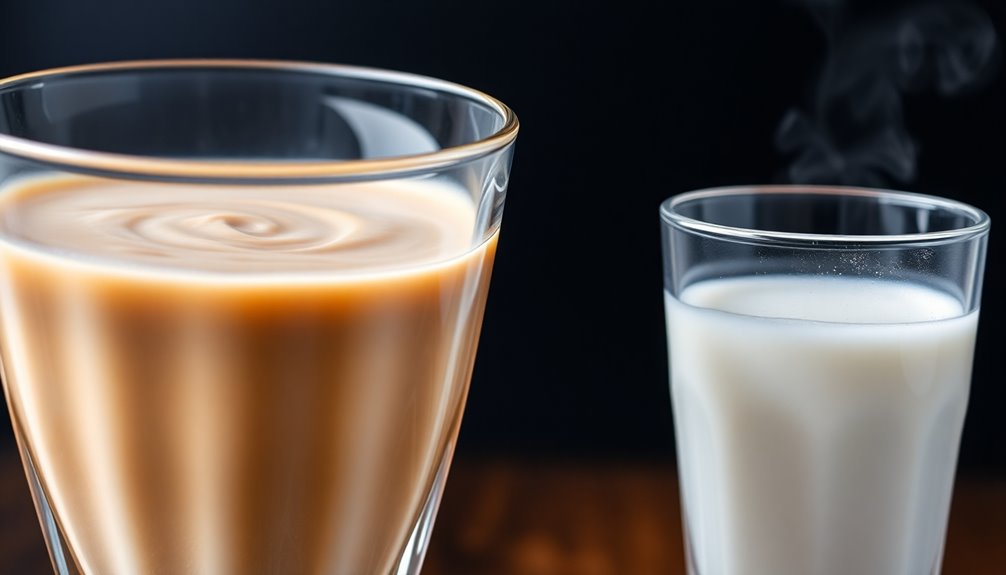When deciding between coffee creamer and milk, it really comes down to your taste preferences. Creamers bring a rich variety of flavors—think vanilla or hazelnut—that can enhance your coffee experience. They also provide a velvety texture and maintain the coffee's boldness. In contrast, milk offers a creamier mouthfeel but can mellow the coffee's strength, giving it a more subtle sweetness. If you're after indulgence, creamers might be your favorite. However, if you prefer a more neutral taste that highlights your coffee's natural flavors, go for milk. There's more to discover about each option's unique qualities.
Key Takeaways
- Coffee creamers offer a variety of flavors, enhancing customization, while milk has a neutral taste that complements coffee's natural flavors.
- Creamers provide a richer, velvety texture without diluting coffee, while whole milk may mellow bitterness but can dilute the coffee's strength.
- Flavored creamers can create a more indulgent experience with higher sugar content, compared to the simpler sweetness of whole milk.
- Nutritionally, creamers can be higher in calories and sugar, while milk provides protein and fewer calories, affecting overall taste experience.
- The convenience and longer shelf life of creamers make them a practical choice for many, while milk requires more careful storage.
Composition and Ingredients

When you choose coffee creamer over milk, you're opting for a product with a unique composition that significantly affects your coffee's flavor and texture.
Creamers often contain 20-40% fat, primarily from hydrogenated vegetable oils, which gives a rich mouthfeel. They usually include sodium caseinate, a lactose-free milk protein that adds creaminess. Sweeteners like corn syrup solids and cane sugar contribute to the overall taste.
Unlike milk, creamers can have emulsifiers like monoglycerides to ensure a smooth blend. Additionally, buffering agents are included to maintain stability and prevent unwanted reactions in your coffee.
Flavor Profile Comparison

Choosing between coffee creamer and milk not only impacts the composition of your beverage but also significantly influences its flavor profile.
Milk has a neutral taste, subtly enhancing your coffee's natural flavors with a hint of sweetness from lactose. Whole milk offers a fuller flavor compared to lower-fat options.
On the other hand, coffee creamers introduce various flavors like vanilla and hazelnut, allowing you to customize your drink. Sweetened creamers create an indulgent experience, while options like half and half provide a balanced richness.
Ultimately, your choice depends on your taste preferences—milk dilutes the coffee's strength, while creamers maintain it, offering a stronger flavor that many coffee lovers enjoy.
Creaminess and Texture

While both coffee creamer and milk enhance your cup of coffee, their creaminess and texture vary significantly.
Creamer often adds a velvety, rich texture, thanks to its blend of water, sugar, and vegetable oil. Flavored creamers amplify this effect, creating a luxurious mouthfeel that milk can't quite match.
Whole milk does provide a creamy texture, but it's less rich and tends to dilute your coffee more. The fat content in whole milk mellows coffee's bitterness, offering a silky experience, especially in lattes and cappuccinos.
In contrast, creamer maintains the coffee's strength while delivering an indulgent texture.
Ultimately, your choice affects the overall drinking experience, with creamer leaning toward richness and milk toward smoothness.
Caloric and Nutritional Content

Understanding the caloric and nutritional content of coffee creamer and milk can help you make a more informed choice for your coffee.
Coffee creamer typically adds about 55 calories per 8 oz cup, while milk adds around 40 calories, depending on the type. Flavored creamers can be especially high, with some containing up to 40 grams of sugar in just half a cup.
Whole milk offers decent protein, but almond milk has less than 1 gram per serving. If you're looking for lower fat options, almond milk or unsweetened creamers provide 0-1 gram of fat.
Convenience and Shelf Life

When it comes to convenience and shelf life, coffee creamer has some distinct advantages over milk.
You'll find creamer in various forms—liquid, powdered, and non-dairy—giving you flexibility based on your needs. Unlike milk, powdered creamer can be stored at room temperature for up to two years unopened.
Once opened, liquid creamer lasts about 1-2 weeks in the fridge, while milk typically lasts only 7-10 days. Non-dairy creamers can last up to six months unopened.
Creamer often comes in pre-measured packets or bottles, making it easy to use just the right amount. Additionally, the longer shelf life of creamer compared to milk can help reduce food waste in your kitchen.
With these benefits, coffee creamer can simplify your coffee routine while ensuring you have a longer-lasting option on hand.
Frequently Asked Questions
Can I Mix Milk and Creamer in My Coffee?
Yes, you can definitely mix milk and creamer in your coffee! This combination lets you customize the flavor and texture to your liking.
By adjusting the ratio, you can achieve the perfect creaminess and sweetness. Mixing them enhances the overall taste, offering a richer experience compared to using one alone.
Just be mindful of adding creamer first to prevent curdling, and experiment with different types to find your ideal blend!
Do Creamers Dissolve Better Than Milk in Hot Coffee?
When you add creamers to hot coffee, they often dissolve more easily than milk.
Creamers usually contain stabilizers that help them mix well, even in higher temperatures. If you're using powdered creamers, they blend quickly without clumping.
Milk, on the other hand, can curdle or separate if the coffee's too hot. To ensure a smooth drink, you should add either slowly while stirring and avoid overheating them before mixing.
Which Option Is Better for Frothing in Coffee?
When it comes to frothing in coffee, you'll find that milk generally performs better than cream.
Milk's ideal texture and ability to incorporate air create a silky foam, making it easier to work with. You can froth it with a steam wand or a frothing tool.
While cream can offer a rich, luxurious texture, it requires careful handling to avoid separation and achieve the right consistency.
Are There Lactose-Free Options for Both Milk and Creamers?
Yes, there are lactose-free options for both milk and creamers.
You'll find lactose-free milk from brands like Silk and Alpro, which maintain the nutritional benefits of regular milk.
For creamers, lactose-free varieties are available, offering that creamy texture without the lactose.
If you're looking for dairy-free alternatives, plant-based options like almond and oat milk are great choices too.
These provide a range of flavors and nutritional profiles to suit your preferences.
How Do Milk and Creamers Affect Coffee Acidity?
When you add milk or creamers to your coffee, you're affecting its acidity.
Milk slightly raises the pH, making the coffee less acidic due to dilution and neutralization.
Creamers, while often richer and sweeter, don't significantly alter acidity levels.
Both options can enhance the flavor and texture, but if you're looking to reduce acidity, consider brewing methods or coffee bean selection instead of solely relying on milk or creamers.
Conclusion
In the end, whether you prefer coffee creamer or milk really comes down to your taste and lifestyle. Creamers offer a wide range of flavors and a rich texture, while milk provides a more natural and subtle taste. If you’re watching your calories, consider the nutritional content of each option. Ultimately, it’s all about what makes your coffee experience enjoyable. So, go ahead and try both to find your perfect cup! Now, if you enjoy a warm cup of tea as well, consider the various tea benefits when it comes to choosing a creamer or milk alternative. Tea offers its own range of flavors and health benefits, such as antioxidants and calming effects. Whether you prefer a splash of creamer or a dash of milk in your tea, the choice ultimately depends on your personal taste and preferences.









